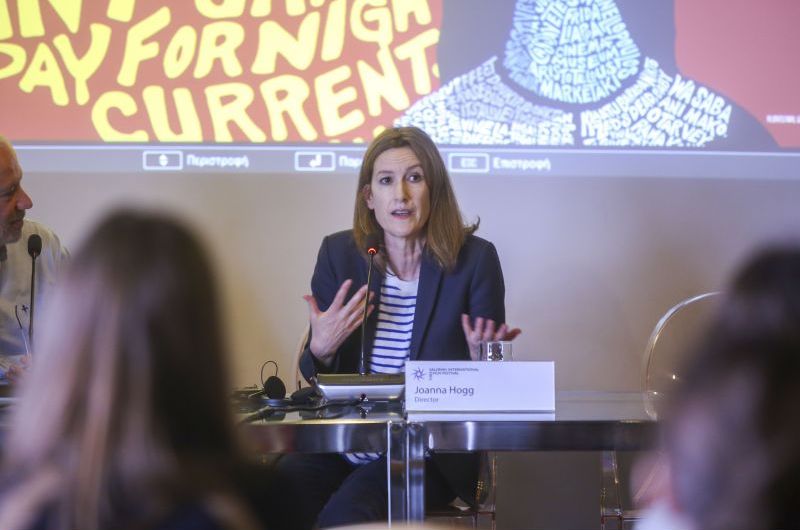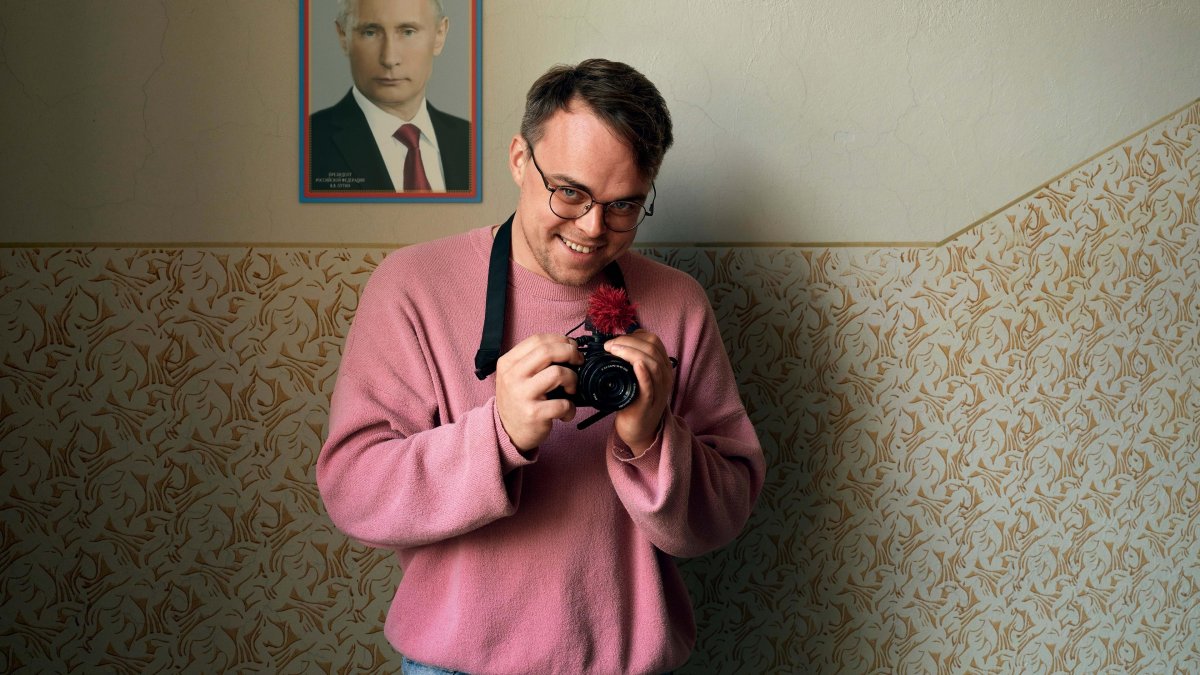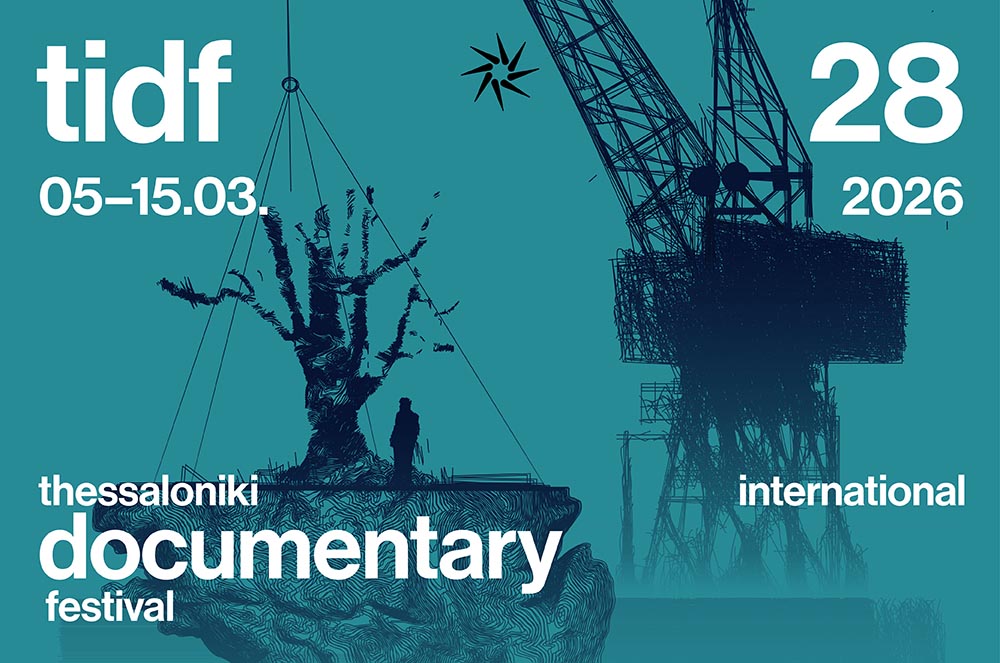60th Thessaloniki International Film Festival || 31/10 – 10/11/2019
Joanna Hogg press conference
The 60th Thessaloniki Film Festival welcomed the British director Joanna Hogg, hosting an honorary tribute to her work; the creator – a pioneer of a new social realism wave – gave a press conference on Saturday, November 2, 2019, at the Photography Museum of Thessaloniki.
The press conference was coordinated by the head programmer of the Festival Yorgos Krassakopoulos. The artistic director of TIFF Orestis Andreadakis introduced Joanna Hogg, noting: “The presence of Joanna Hogg in Thessaloniki is a great honor. This tribute also inaugurates our collaboration with the British film magazine Little White Lies (whose current issue pays tribute to Hogg) that in the future will choose films for the Festival.”
Referring to the last film by the British auteur, the semi-autobiographical The Souvenir (consisting of two parts – The Souvenir II will soon follow), Yorgos Krassakopoulos asked Joanna Hogg what prompted her to put forward such a private story. The director pointed out that this movie is not more or less personal than the rest of her films, but, as she put it “it was the first time I looked back to a certain period of my life and thought about doing these two Souvenir films, retracing a relationship similar to the one depicted in the film, when I was still quite young.”
Recalling her youth, Joanna Hogg said that things were different then in relation to the way she approached cinema. “When I was young, I wasn’t thinking of the difficulties; I knew that there were not many female directors working in Britain: then I caught myself thinking more about the restrictions, back then I had a blissful ignorance and that gave me self-confidence – I thought I could become a director. I had confidence before I went to film school. I believed I could first dabble in cinema, and then acquire some knowledge. In school, there was a concrete idea about what cinema should be and I did not fit into that idea, I wanted to create a cinema that my professors could not understand. It was not a question of gender; other female students were supported by the school.”
Answering Yorgos Krassakopoulos’ question whether she felt self-assured when she made her first film, Unrelated (2007), Joanna Hogg said: “There are always doubts, but I had already worked in television for 12 years. I was of course directing screenplays written by others back then and maybe in that department I had more doubts because I fought a system that did not let me do what I wanted to do. I wanted to say my own words, use my own voice. I was sure I was doing the right thing and never doubted whether I had to do that film at that time.”
Referring to her first film, she added that she worked on a proper screenplay in the beginning, but soon she turned to improvisation. “Two days after we started, I realized that I was interested more in what I had in front of me. I like improvisation, not knowing where I am going, doing things on the spot.” In what concerns how actors respond to improvisation, the British director said: “It depends on the actor; some find it scary; some do not like it and want to leave. I tend to look in advance for actors ready to take the risk. Yet one does not know how brave they are before the shooting starts.”
Joanna Hogg usually works with non-professional actors, and that is something, as she said, that delights her. “Sometimes I meet people and I think they have an aspect that I like. I do not want to know beforehand what kind of performance I will get; I want to discover someone during shooting. Non-professionals are usually more natural, with more confidence.” She likes working with regular collaborators. “It is lovely to have the same collaborators for each film, since you know each other and the work cuts deeper. On occasion, I have a new collaborator, as David Raedeker, the director of photography for The Souvenir. It was interesting, as if going on a first date with someone.”
On why she chose Honor Swinton Byrne (daughter of Tilda Swinton, a friend and collaborator) as the protagonist of her film, Joanna Hogg explained: “Now, I can’t imagine anyone else for the part, but it took me some time to spot her. I knew Honor as daughter of my friend and I thought one does not put the children of one’s friends in a film. During a random encounter on a railway platform, something Honor said made me think that she could play in the film, she fitted into what I had in mind.”
She was always thinking, as she mentioned, of filming The Souvenir in two parts. “It wouldn’t be a very long film, it would be the narrative of an experience, a story, and then a reaction to this story. For me the first part of The Souvenir cannot exist without the second. One has to see the rest of the journey. I am now editing the second part. The thought behind this is that you can see the movie as a standalone film, but also be able to see, if you like, the second part before the first.”
To Yorgos Krassakopoulos’ question on the way she approached 80s London in The Souvenir, Joanna Hogg responded: “It was very difficult for me to be objective for the place where I grew up and still love. The city that I knew in the beginning of the 80s no more exists, so I had to reconstruct the era. I used old photos that I had taken (I was a photographer before), and we also created sets in places where I used to live. That was how I rendered the sense of place; I created an experience of 80’s London.” This process, as the director explained, was for her a kind of time-traveling. “It was a journey with very sad moments, a melancholic procedure, since in the photographs I could see faces that are no more. I feel that I miss this time so much, so many memories sprang up among so many ephemeral things. It is wonderful having lived in that era, an unstable but creative era.”
In what concerns her habit to keep notes as a daybook since her early youth, Joanna Hogg said that she didn’t do it out of fear of forgetfulness, but because “I had to take down notes, to get it out of myself, as a kind of catharsis on the spot.”
To a question on the importance she attributes to distinction, as of the Sundance Jury award she received recently, the British director said: “Awards are not the reason I make films. It is something pleasant for my crew, my collaborators, but for me it makes no difference – one way or another I am going to create what I have to create. If one makes movies in order to receive an award, the journey then is not satisfactory. Yet an important aspect of this is that an award will make more people see the film.”
To a question concerning her place in the British film industry and whether she feels different from her compatriot directors, Joanna Hogg said: “I don’t watch a lot of British films in order to give you a satisfactory response. There are several directors that make personal films, such as Ben Rivers, Peter Strickland, or Lynne Ramsey; but we are all different. I follow my instinct, I don’t look around for comparisons because this is dangerous, I stay on my track. British cinema faces a problem the way funding goes in relation to writing a screenplay. This process maybe encourages young filmmakers to go to the end of their screenplay, but it is a very strict process and we have to resist because this is the way similar films are made, since a lot of outward voices intervene and the interior voice of the creator gets lost.”
She confesses that she takes her time making her movies. “I can’t work on more than one film at a time. I have designed the two Souvenir films together and that is why I work on them in juxtaposition. But still, I would like to do things faster.” From where she draws inspiration she said: “Inspiration comes from something quotidian, a conversation for example. I constantly look around, people interest me and inspiration comes from my observations, my daybooks, small details that obsess me that then turn into a movie.”
With the support of the British Council















